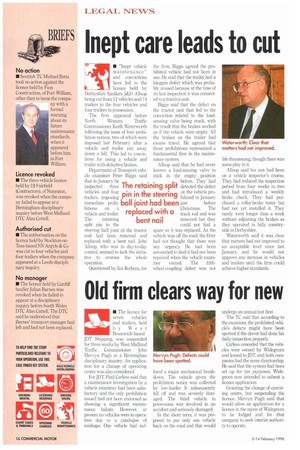Inept care leads to cut
Page 18

If you've noticed an error in this article please click here to report it so we can fix it.
• "Inept vehicle maintenance" and convictions have led to the licence held by Derbyshire hauliers J&D Allsop being cut from 12 vehicles and 14 trailers to the four vehicles and four trailers in possession.
The firm appeared before North Western Traffic Commissioner Keith Waterworth following the issue of four prohibition notices, two of which were imposed last February after a vehicle and trailer ran away down a hill. This led to convictions for using a vehicle and trailer with defective brakes.
Department of Transport vehicle examiner Peter Biggs said that in January he
inspected three The retaining split vehicles and four i trailers, imposing pin n the steering immediate prohiball joint had been vehicle and trailer. replaced with a
bitions on a •
vehicles and four i
split pin in the steering ball joint of the tractor unit had been removed and replaced with a bent nail. John Allsop. who was in day-to-day control, seemed to lack the initiative to oversee the whole operation.
Questioned by Ian Rothera, for the firm, Biggs agreed the prohibited vehicle had not been in use. He said that the trailer had a kingpin defect which was probably missed because at the time of its last inspection it was connected to a tractive unit.
Biggs said that the defect on the tractor unit that led to the conviction related to the loadsensing valve being stuck, with the result that the brakes worked as if the vehicle were empty All the brakes on the trailer had excess travel. He agreed that those prohibitions represented a fundamental flaw in the maintenance system.
Allsop said that he had never known a load-sensing valve to stick in the empty position before. They had detected the defect on the vehicle prohibited in January just before Christmas. The track rod end was removed but they could not find a spare so it was replaced. As the vehicle was off the road, the fitter had not thought that there was any urgency. He had been astounded to find it had not been repaired when the vehicle exam
iner visited. The fifthwheel-coupling defect was not
life threatening, though there was some play in it.
Allsop said his son had been on a vehicle inspector's course. They had reduced the inspection period from four weeks to two and had introduced a weekly brake check. They had purchased a roller-brake tester but had not yet installed it. They rarely went longer than a week without adjusting the brakes as they operated in hilly countryside in Derbyshire.
Waterworth said it was clear that matters had not improved to an acceptable level since last January, and he would not approve any increase in vehicles and trailers until the firm could achieve higher standards.




































































































